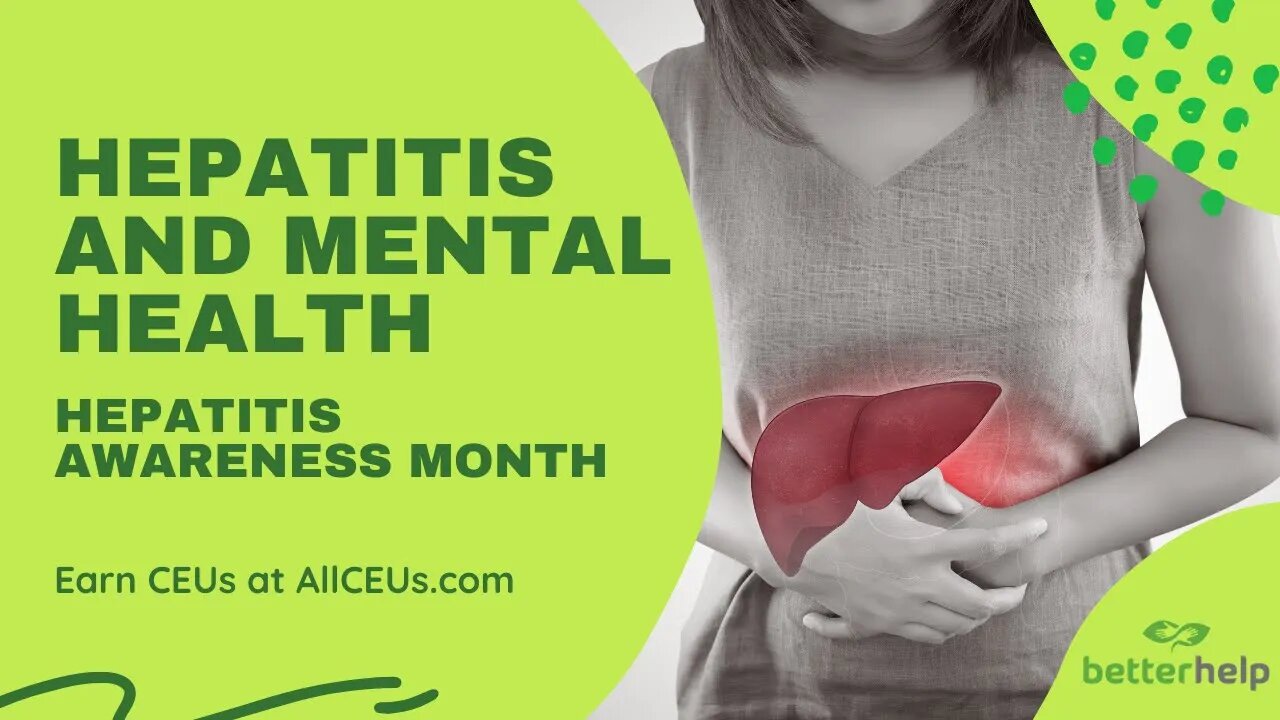Premium Only Content

Impact of Hepatitis on Mental Health and Addiction Recovery
Sponsored by BetterHelp. Clinicians, sign up with BetterHelp to increase your bookings and work from the comfort of your own home. https://hasofferstracking.betterhelp.com/aff_c?offer_id=20&aff_id=2373
#hepatitis #mentalhealthawareness #interfeuronalpha #Cirrhosis
Want to chat with me? Join me at https://members.docsnipes.com/ For $10/month you get access to my daily tips for health and wellness and you can text chat with me privately.
Impact of Hepatitis on Recovery
Based in Part on SAMHSA TIP 53
Dr. Dawn-Elise Snipes
AllCEUs Counselor Education
CEUs Available at: http://allceus.com/member/cart/index/product/id/1460/c/
Objectives
~ Learn about hepatitis and its prevalence
~ Identify the consequences of hepatitis
~ Explore the impact of hepatitis on mental health and effective interventions
Intro
~ Hepatitis refers to an inflammatory condition of the liver caused by a viral infection, autoimmune hepatitis or as a secondary result of drugs, toxins, or alcohol.
What does the liver do
~ Filtering of toxins from your body
~ Filtering and excretion of toxins
~ Ammonium is produced when proteins break down, some of which is used by the brain to make glutamine– the rest is filtered by the liver. If the liver malfunctions, it causes an excess amount of ammonium, and therefore glutamine production in the brain which can trigger inflammation called hepatic encephalopathy
~ Breakdown of carbohydrates, fats, and proteins
~ Activation of enzymes essential to body functions
~ Storage of glycogen, minerals, and vitamins (A, D, E, and K)
~ Synthesis of blood proteins, such as albumin which serves as an antioxidant eliminating free radicals that contribute to depression
~ Synthesis of clotting factors
Types of Hepatitis
~ Hepatitis A usually last less than 2 months, although 10%–15% of symptomatic persons have prolonged or relapsing disease for up to 6 months, but does not become a chronic, long-term, infection
~ Hepatitis B: about 90% of infants with hepatitis B go on to develop chronic infection, whereas only 2%–6% of people who get hepatitis B as adults become chronically infected and have increased risk of liver cancer (preventable with vaccination).
~ Once diagnosed, most people with hepatitis C can be cured in just 8 to 12 weeks, reducing liver cancer risk by 75%.
~ Hepatitis D can only be contracted by someone with Hep B
~ Hepatitis E is spread through ingestion of feces from infected people and most people have a full recovery.
~ Autoimmune Hepatitis
~ Alcoholic Hepatitis
Side Effects of Hepatitis
~ Activation of proinflammatory cytokines may directly lead to the development of depression via direct CNS effects including fatigue, anhedonia, social isolation, psychomotor slowing, decreased appetite and libido, hyperalgesia, sleep disturbance, and neurocognitive impairment
~ Major depression in nearly 25% of untreated HCV patients
~ HCV infection may result in cognitive impairment prior to development of cirrhosis, and may be unrelated to a history of illicit drug use or mood disorder in some patients
~ Sleep disturbances affect about 50 percent of people with hepatitis C an can worsen other behavioral health symptoms
Mental Health Issues and Hepatitis Tx
~ Hepatitis medications (interfeuron-alpha) may cause depression, delirium, irritability, mania
~ IFN-α activates CNS opioid receptors
~ IFN-α may damage neurons by causing cerebral edema, increases in free radicals, and the promotion of glutamate release causing excitotoxic cell death
~ Baseline depression and/or anxiety, even when subclinical, predicts the development of psychiatric morbidity during IFN-α treatment
~ IFN-α induces the enzyme indole-amine 2, 3-dioxegenase (IDO), which causes a diversion of the metabolism of tryptophan away from serotonin
~ Hepatitis medications (interfeuron-alpha) may cause depression, delirium, irritability, mania
~ Irritability is a classic symptom of mania and a common adverse effect of IFN-α with 20% of patients demonstrating manic or hypomanic symptoms at some time point during six months of treatment
~ Up to 77% of patients receiving IFN-α plus ribavirin for HCV report fatigue during treatment
Summary
~ The liver is involved in managing blood sugar, production of antioxidants to reduce inflammation, filtering out toxins that can contribute to inflammation and creation of neurotransmitters
~ Interfeuron-alpha treatment as well as hepatitis itself can contribute to anxiety, irritability, mania, depression, grief
~ Many clients benefit from a combination of health education, motivational enhancement, development of a risk reduction plan and cognitive restructuring.
-
 8:52
8:52
DocSnipes
1 year agoHow Cognitive Distortions Contribute to Violence
208 -
 1:15:25
1:15:25
Glenn Greenwald
7 hours agoTulsi and RFK Jr. Approved by Key Senate Committees; Trump Meets Netanyahu: Wants to Cleanse Gaza; Pro-Palestinian Group Suspended at UMich | SYSTEM UPDATE #402
77K97 -
 1:43:57
1:43:57
Danny Polishchuk
7 hours agoThe Funniest Call In Show On Earth - Live From New York City's Best Comedy Club
35.2K1 -
 1:41:13
1:41:13
megimu32
7 hours agoON THE SUBJECT: Will the Super Bowl Be WOKE??!
30K6 -
 1:18:26
1:18:26
Redacted News
8 hours agoBREAKING! USAID Created and Funded COVID-19 Virus and Bioweapons, RFK and Tulsi pass major hurdle
150K201 -
 50:54
50:54
Candace Show Podcast
8 hours agoBecoming Brigitte: Gaslighting The Public | Ep 1
199K206 -
 4:41:05
4:41:05
Right Side Broadcasting Network
13 hours agoLIVE: President Trump Holds Press Conference with Israeli PM Benjamin Netanyahu - 2/4/25
225K99 -
 1:11:49
1:11:49
Edge of Wonder
8 hours agoInception Is Real: How Ads Are Showing Up in Our Dreams
36.5K6 -
 54:50
54:50
LFA TV
12 hours agoThe Trade War Ends | TRUMPET DAILY 2.4.25 7pm
33.5K7 -
 2:05:37
2:05:37
Quite Frankly
12 hours ago"Capitol Hill Headlines & The Utah Case" ft Lauren Conlin, The Zells 2/4/25
39.1K7